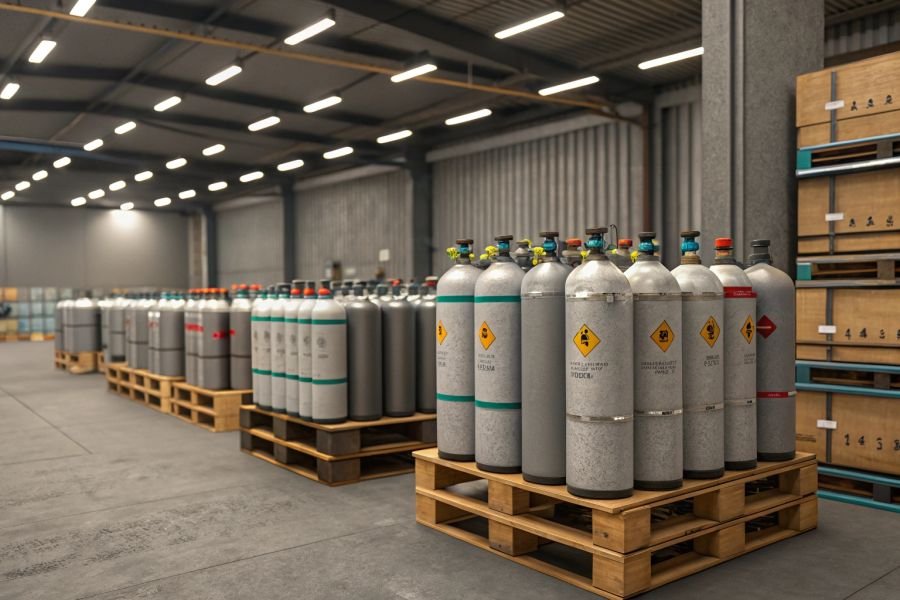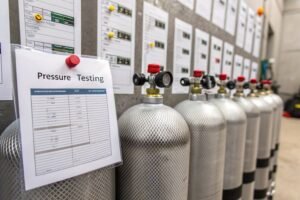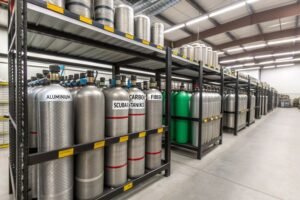Tired of confusing price quotes for scuba tanks? A wrong choice can risk your reputation and profits. I’ll show you how to see the real cost and choose wisely.
The true cost of a scuba tank for a B2B buyer isn't just the unit price. It includes material quality, manufacturing standards, supplier reliability, and shipping logistics. Focusing on these factors ensures better ROI and protects your brand's reputation in the long run.
I've been in the cylinder manufacturing business for years, and my team and I have spoken to hundreds of buyers. Many of them, like a client I know named David who runs a wholesale business in Australia, initially focus on the price per unit. But they quickly learn that the real value lies deeper. The sticker price on a quote doesn't tell you about the safety certifications, the durability of the materials, or whether your shipment will arrive on time. To really understand your investment, you have to look past the first number you see. We need to break it down, piece by piece. Let's start with the most basic question: what actually makes up that price tag?
What factors truly determine the wholesale price of a scuba tank?
Ever get quotes for similar-looking tanks with wildly different prices? Choosing the cheapest feels like a gamble on quality. Let's uncover what really drives the cost so you can compare accurately.
The wholesale price of a scuba tank is mainly set by four things: the raw material (like aluminum alloy grade), the manufacturing complexity, the safety certifications (DOT, PI, etc.), and the order volume. High-grade materials and rigorous testing cost more but ensure safety and durability.
Diving Deeper into Price Factors
When you get a quote, you're seeing the end result of a long process. Each step has a cost, and a good manufacturer is transparent about it. Let's look at the four main components that determine the final price you pay.
1. Raw Materials: Not All Metal is Equal
The single biggest cost factor is the material itself. For aluminum tanks, we use high-strength aluminum alloy 6061. The key here is the quality and purity of the alloy. As a factory, we can source cheaper, lower-grade, or recycled aluminum. Doing so would lower our costs, and we could offer you a "cheaper" tank. But this material can have impurities that create weak spots, making it prone to stress fractures and corrosion. We choose to source only top-grade, pure alloy. It costs more upfront, but it creates a tank that is safer, more durable, and has a longer service life. When you see a very low price, you should always question the quality of the metal.
2. Manufacturing and Technology
Turning a block of aluminum into a high-pressure cylinder is a complex process. It involves extrusion, heat treatment, neck threading, and surface treatments. Each step requires precise machinery and skilled operators. For example, our five production lines use automated systems to ensure every cylinder has a consistent wall thickness. Inconsistent thickness is a major safety hazard. Our threading machines are calibrated daily to ensure valves fit perfectly with no leaks. A factory that cuts corners on machinery maintenance or worker training can produce tanks with hidden flaws that only become apparent when it's too late. The investment in top-tier technology and a well-trained team is reflected in the price, but more importantly, in the quality of the final product.
3. Certifications and Testing
This is a big one. A scuba tank is a piece of safety equipment, and it must be certified to be sold in most markets. We produce cylinders with certifications for major markets worldwide.
| Certification | Region/Use | What it Means for You |
|---|---|---|
| DOT | USA | Your tanks are legal for sale and use in the United States. |
| TC | Canada | Your tanks meet Canadian safety standards. |
| PI (π) | Europe | Your tanks comply with European directives for transportable pressure equipment. |
| ISO 9001 | International | The manufacturer has a certified Quality Management System. |
Each of these certifications requires rigorous, documented testing. This includes hydrostatic testing on every batch, burst tests, and cycle tests. This testing process is expensive. It requires specialized equipment and adds time to production. A supplier who offers tanks without the correct certifications for your market is offering you a product that is not only illegal to sell but also potentially dangerous. The cost of certification is a necessary investment in safety and market access.
Why is prioritizing quality over the lowest price crucial for your long-term profitability?
That low price from a new supplier is tempting for your profit margin. But what if those tanks lead to customer complaints or safety issues? Let's see why quality is your best investment.
Prioritizing quality protects your business from expensive risks like product recalls, liability claims, and brand damage. High-quality tanks last longer, pass inspections easily, and create happy, repeat customers. This builds a trustworthy reputation that is far more valuable than the small savings from a cheap supplier.
The Real Math: Profitability Beyond the Invoice
I once spoke with a buyer who was very proud of the "deal" he got from a new supplier. He saved about 15% on his initial order compared to other quotes. Six months later, he called me. About 10% of his shipment had failed their first visual inspection due to "orange peel" corrosion on the inside. He had to scrap those tanks, instantly wiping out his initial savings. Even worse, his customers were now wary of the rest of the batch. His story taught him a hard lesson about the hidden costs of "cheap."
Your Brand's Reputation is Priceless
For a B2B business like yours, whether you're a wholesaler, distributor, or run a dive center, your reputation is your most valuable asset. The products you sell carry your name. If you sell a dive tank that leaks, fails an inspection, or feels poorly made, your customer doesn't just blame the unknown factory in China. They blame you. The diving community is small and connected. Word spreads fast. Saving a few dollars per tank is not worth losing a customer who spends thousands with you over several years. A high-quality tank from a reliable manufacturer like us becomes a symbol of your own company's commitment to quality and safety.
Liability and Safety: The Non-Negotiable
We are in the business of high-pressure equipment. This is not an area to cut corners. A cylinder failure can be catastrophic, leading to serious injury or worse. The legal and financial fallout from such an event can destroy a business. When you invest in a cylinder that has been properly manufactured and rigorously tested to meet global standards like DOT and PI, you are not just buying a product. You are buying peace of mind. You are buying protection for your customers and your business. This isn't a cost; it's the most critical insurance you can have.
How do aluminum and carbon fiber scuba tanks compare in terms of investment and performance?
Choosing between aluminum and carbon fiber tanks for your inventory can be tricky. Pick the wrong one, and your capital is tied up. Let's compare them so you can stock exactly what sells.
Aluminum tanks are the industry workhorse: durable, corrosion-resistant, and more affordable upfront. Carbon fiber tanks are significantly lighter and can hold higher pressures, appealing to technical or traveling divers. Your choice depends on your primary customer base and their budget.
Stocking the Right Tank for the Right Diver
The choice between aluminum and carbon fiber isn't about which one is "better" overall. It's about which one is better for a specific type of customer and use case. As a wholesaler or distributor, understanding this difference is key to managing your inventory and meeting market demand.
Aluminum (AL) 6061 Tanks: The Industry Standard
This is the most common type of scuba tank in the world, and for good reason. They are incredibly durable and resistant to corrosion, especially in saltwater environments when properly cared for. They are the workhorses of the rental industry. Dive shops love them because they can handle the daily abuse of new divers. From a business perspective, their lower initial cost makes them an easier investment for building up a large rental fleet or for stocking as a primary retail option. Many divers also prefer their buoyancy characteristics; they start negatively buoyant and become less negative as they are emptied, which can simplify weighting.
Carbon Fiber Composite Tanks: The Premium Choice
Carbon fiber tanks are all about high performance. Their main advantage is weight. A carbon fiber tank can be 30-40% lighter than an aluminum tank of the same capacity. This is a huge selling point for divers who travel or have to carry their gear over any distance. They also can be rated for higher pressures (up to 300 BAR / 4500 PSI), which means they can hold more air in a tank of the same or smaller size. This appeals to technical divers who need more gas for longer, deeper dives. The tradeoff is a significantly higher investment cost. These are premium products for a more experienced and less price-sensitive segment of your market.
Here is a simple breakdown for your reference:
| Feature | Aluminum Tank | Carbon Fiber Tank |
|---|---|---|
| Initial Cost | Lower | Higher |
| Weight | Heavier | Much Lighter |
| Pressure Rating | Typically 200 BAR / 3000 PSI | Up to 300 BAR / 4500 PSI |
| Buoyancy | Starts negative, becomes neutral/positive | More buoyant, often requires more weight |
| Durability | Very robust, resistant to impact | Strong, but outer wrap is sensitive to cuts/gouges |
| Ideal Customer | Rental fleets, new divers, budget-conscious divers | Traveling divers, technical divers, divers wanting top performance |
What are the hidden costs of sourcing from an unreliable cylinder manufacturer?
That super-low price from a new factory looks great on paper. But now they're slow to reply, and you're worried about your order. Let’s talk about the real price of a bad supplier.
Hidden costs from an unreliable supplier include production delays that lead to lost sales, expensive shipping mistakes, and the immense time wasted on poor communication. You may also face quality issues that require costly replacements or damage your brand's reputation with customers.
More Than Just an Invoice: The Nightmare of a Bad Partner
The biggest complaints I hear from new clients about their previous suppliers are almost never about the product's price. They are about the frustrating and expensive problems that come from working with an unprofessional factory. These are the "hidden costs" that turn a great deal into a nightmare. I spoke with a potential client, Juan, from the USA who was sourcing cylinders for a new hydrogen storage system. He chose a supplier based on price. His biggest problem? The supplier's sales team was a black hole.
1. The Communication Black Hole
This is the most common and frustrating problem. You send an important email with a question about the production schedule or a technical specification. Days go by. You send a follow-up. More silence. In our business, time is money. A delay in getting an answer can cause a delay in your own planning, marketing, and sales. We know you are in a different time zone. A professional export team, like mine at Snowrain, is structured to provide prompt replies. Our goal is to answer your questions within 24 hours. Inefficient communication is a huge red flag that signals deeper problems in the company. It was the main reason Juan started looking for a new partner.
2. The Chain Reaction of Delays
An unreliable supplier will often give you an optimistic lead time to win your order. Then the excuses begin. "There was a problem with raw materials." "There is a local holiday." "Your order is in line behind a bigger one." These delays create a chain reaction for your business. You miss a key selling season. Your customers cancel their pre-orders. Your cash flow is tied up in a deposit for goods that never seem to arrive. A good manufacturer provides a realistic lead time and communicates proactively if there are any issues. We understand that a predictable supply chain is critical for your business to run smoothly.
3. The Bait-and-Switch on Quality
This is the most dangerous hidden cost. The sample you receive is perfect. It passes all your tests. You place a large order. When the container arrives, the products are not the same. The finish is poor, the threads are rough, or worse, they use a lower-grade material. The supplier knew that it would be too expensive for you to ship the entire container back. Now you are stuck with a massive problem. You either have to sell a substandard product and risk your reputation, or you have to absorb a huge financial loss. This is a tactic used by dishonest factories, and it’s a risk you take when the price seems too good to be true.
How can you evaluate a supplier to guarantee quality, value, and on-time delivery?
You have a list of potential suppliers. How do you pick the right one and avoid all the headaches? Here is a simple checklist to help you choose a reliable long-term partner.
Evaluate a supplier by verifying their certifications (like DOT, ISO), asking for production videos or a factory audit, and checking their communication responsiveness. Ask for references and test their product knowledge. A great partner will be transparent and act as a consultant, not just a seller.
Your Checklist for Finding a Great Manufacturing Partner
Choosing a supplier is like hiring an employee who will be responsible for a critical part of your business. You need to do your due diligence. Here is a practical, step-by-step guide to help you evaluate potential manufacturers. This is the exact process I would recommend to a friend.
-
1. Verify Their Certifications: This is your first, non-negotiable step. Don't just look for a "DOT Certified" logo on their website. Ask them to email you a copy of their current certificates. Check the name, the date, and the issuing authority. A proud, legitimate factory will provide these documents immediately. If they hesitate or make excuses, walk away.
-
2. Test Their Communication: Before you even talk about placing an order, test their responsiveness. Send them an email with a few specific, technical questions. How quickly do they reply? Is the answer clear, professional, and helpful, or is it a vague, one-sentence reply? This simple test tells you a lot about how they will treat you once they have your money. It directly addresses the main pain point for buyers like David and Juan.
-
3. See the Factory for Yourself: In the past, this meant an expensive trip. Today, it's as easy as a video call. Ask for a virtual factory tour. Ask them to walk you through the production line with their phone. Show me the raw materials. Show me your hydrostatic testing station. Show me your finished inventory. A factory that is confident in its process and quality will be excited to show you. A factory with something to hide will always have an excuse.
-
4. Ask About Their Quality Control (QC) Process: How do they ensure quality? Do they only test the final product, or do they have QC checkpoints throughout the manufacturing process? Ask to see their QC checklist. A professional manufacturer will have a documented process for everything from inspecting incoming raw materials to final pre-shipment inspection.
-
5. Check Their Track Record: Don't be afraid to ask for references. A supplier with a history of success will be happy to connect you with long-term clients, perhaps even one in your own region like North America or the Middle East. If they can't provide any references, it may be because they don't have any happy customers.
Are you choosing a manufacturing partner who can help your business grow?
You can find many suppliers who just sell you products. But will they help you when you have a special request or a market opportunity? Let’s talk about finding a real growth partner.
A true manufacturing partner acts as an extension of your team. They offer services like OEM branding, advise you on market trends, maintain consistent quality, and provide reliable lead times. Their success is tied to yours, creating a foundation for mutual growth and long-term profitability.
Moving from a Supplier to a Partner
After you've verified a factory's quality and reliability, the final question is this: Is this a company I can grow with? A simple supplier is transactional. A true partner is relational. They are invested in your success because they know that as you grow, they will grow too. This is the philosophy we have built our company on.
Beyond the Transaction
A partner works with you. They understand your market. For a wholesaler, a partner might suggest a new popular product or color for your region based on what they see in global trends. For an innovator working with new technology like hydrogen, a partner collaborates on R&D and custom designs to meet unique challenges. They become part of your team, helping you solve problems and seize opportunities. We offer full OEM services, from custom colors and logos that build your brand, to specific valve and thread requirements for your market.
Consistency is the Foundation of Trust
A business relationship is built on trust, and trust is built on consistency. A real partner delivers the same high-quality product on your tenth order as they did on your first. They give you reliable lead times and stable pricing so you can manage your inventory and cash flow without constant, stressful surprises. This predictability is what allows you to focus on selling and growing your business, secure in the knowledge that your supply chain is solid. This is our commitment.
Your Success is Our Success
At Snowrain, we don't just want to sell you a container of cylinders. We want to be the factory you call your partner for the next ten years. We succeed by helping you provide safe, reliable, high-quality products to your customers. We take that responsibility very seriously. When you are ready to work with a team that is as committed to your business's quality and growth as you are, we're ready to talk. You can email me directly at snow@cylindify.com. I read and respond to every email personally.
Conclusion
Choosing the right scuba tank supplier is about more than price. It's about finding a reliable partner who values quality, safety, and your business's long-term success.







